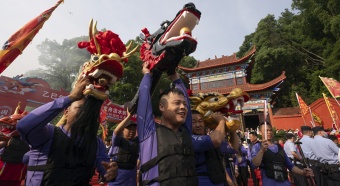The SCO has become an important multilateral institution to promote regional security, as its security boundaries have sprawled into energy cooperation, military cooperation, counter terrorism, intelligence sharing and above all promoting the proliferation of connectivity in the region, yet it’s not a military block or an alliance directed towards any specific country. With India and China, the two largest and fastest developing countries as its members, the contribution they are making together with other members to the global economic growth and prosperity is quite significant.
“An open and innovative Asia for a world of greater prosperity and development” mirrors the vision of SCO for Asia and the world in the wake of protectionist and anti-globalization tendencies, especially in the developed world. It reflects the inclusivity, unimpeded trade and investment, and the greater flow of human recourses necessary for innovation and capacity building between the nations, regions, and the world. An open and innovative Asia will certainly push the global economic growth, regional economic integration, and also build trust between the countries. This is necessary if the dividends of the 4th industrial revolution are to be reaped by countries across the globe, the developing countries in particular.
As far as India is concerned, it became a formal member of the SCO during its summit on 8th June 2017 in Astana, Kazakhstan. At the outset, the SCO provides India opportunity and an excellent platform to engage with other member states in Eurasian continent and calibrate its policies in the region accordingly.
Secondly, since fighting terrorism, separatism, and extremism has been another important goal of the SCO ever since its formation in 2001, and during the Tashkent Summit in 2004 a Regional Anti-Terrorist Structure was officially inaugurated, I believe the expansion of the SCO would entail a more coordinated approach on terrorism. Sharing of intelligence, counter terrorism operations and combat experience etc. of various countries will come handy.
As regards, China’s role, since China’s GDP surpasses the combined total of all the members, it offers immense opportunities for member states to benefit at bilateral and multilateral levels. Until last year, the SCO was limited to China, Russia and Central Asia, the inclusion of India and Pakistan has certainly extended the SCO multilateralism to South Asia, thus expanding its diplomatic, economic, cultural, and security boundaries, and making it perhaps world’s largest multilateral institution in terms of population and geographical area. Secondly, China has committed along with other members that the SCO is not a security or military bloc directed against any country, the institution rather calls for peace, stability and prosperity in the region and fight together the traditional and non-traditional security challenges in a better and coordinated way. Thirdly, by the way of advocating Belt and Road initiative (BRI) in Eurasia, China will not only bring in physically integration, but more importantly economic integration as well, thus providing regional peace and stability.
The fundamental reason for continuing to grow and develop is that membership has always firmly adhered to the “Shanghai spirit”. We look forward to taking the Qingdao Summit as an opportunity to promote “Shanghai spirit”, further enhance the solidarity and mutual trust of member states, and deepen mutually beneficial cooperation in various fields. Under the guidance of “Shanghai spirit”, we expect that India can deepen its cooperation with member countries in various fields and contribute to the security and prosperity of the region.
B. R. Deepak is Professor of Chinese and China Studies at the Centre of Chinese and Southeast Asian Studies, Jawaharlal Nehru University, New Delhi, India









